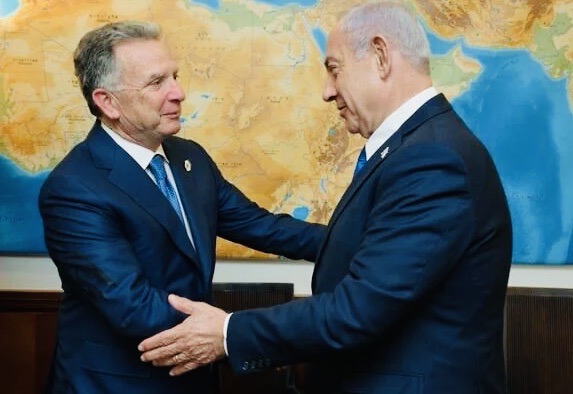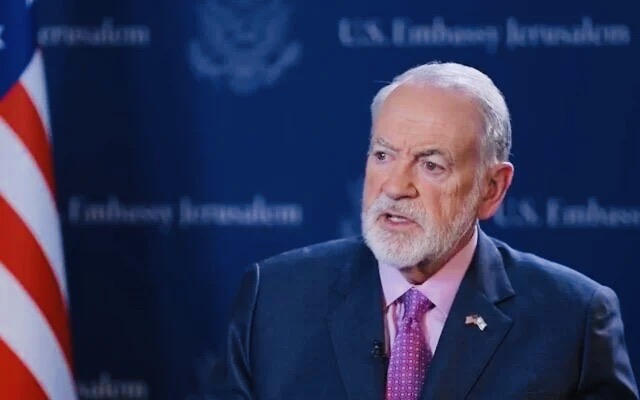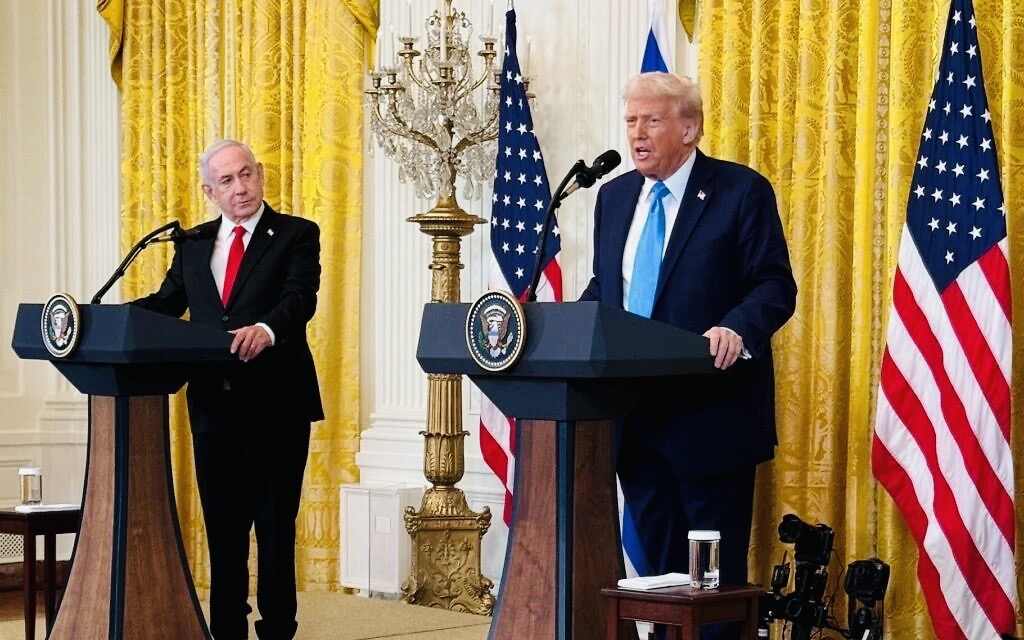Israeli Prime Minister Benjamin Netanyahu projected optimism last month after speaking on the phone with U.S. President Donald Trump. He claimed they were on “the same side of every issue” from the current war in the Gaza Strip to Iran’s nuclear program.
Trump concurred with Netanyahu, writing on his social media platform, Truth Social, that their conversation went “very well.”
But only about ten days later, Israel Hayom, Israel’s biggest daily, reported that Netanyahu was frustrated with Trump’s Middle East policies.
What happened?
There was a lot of water under the bridge, so to speak.
When Netanyahu visited the White House last month, for the second time since Trump took office in January, he hoped the president would support his audacious plan for an Israeli military operation to demolish Iran’s nuclear facilities. Netanyahu was stunned and disappointed when Trump, an erratic, unpredictable and transactional politician, informed him that he intended to engage Iran in direct talks.
Netanyahu has reportedly told associates that he is concerned about these discussions. There have been four rounds of U.S.-Iran negotiations so far to revive and strengthen the 2015 Iran nuclear agreement. Netanyahu is worried that Trump, whom he has hailed as the most pro-Israel president in American history, may settle for an accord that falls short of the full dismantlement of Iran’s nuclear infrastructure. Netanyahu has warned that a “bad deal is worse than no deal.”
In private, Netanyahu has said that U.S. talks with Iran are a waste of time because the Iranian regime will never honor any deal. Netanyahu believes that Iran should be attacked now because it has never been as vulnerable as it is today.
Iran has been weakened by U.S. economic sanctions. Israel has degraded Iranian proxies in the Axis of Resistance such as Hamas and Hezbollah. Israeli air strikes crippled Iranian air defences last October. Iran’s chief regional ally, Syrian President Bashar al-Assad, was toppled last December and fled into exile to Moscow.
Netanyahu was particularly upset by Trump’s remark that he had yet to decide whether Iran would be allowed to enrich uranium under a new agreement. Ron Dermer, an Israeli minister close to Netanyahu, conveyed that message to Trump and his Middle East envoy, Steve Witkoff, during a meeting at the White House recently.

Netanyahu also expressed concern that Mike Waltz, Trump’s national security advisor, had been removed. In accordance with Netanyahu’s view, Waltz had called for the total dismantlement of Iran’s nuclear facilities. According to The Washington Post, Trump was miffed by his hawkish position on Iran.
Unlike Netanyahu, Trump prefers to resolve differences with Iran by means of diplomacy rather than war. As he told Time magazine, he will not be “dragged” into a war with Iran by Netanyahu.
Concerning another issue, Trump is reportedly frustrated with Netanyahu’s decision to launch a new offensive in Gaza. He apparently believes that the war will make it harder to implement his bizarre scheme to “own” Gaza and transform it into a French-style Riviera.

Witkoff recently told families of the Israeli hostages held by Hamas in Gaza that he disagrees with Israel’s approach to the war. “Israel is prolonging the war, even though we do not see where further progress can be made,” he said.
Witkoff apparently believes that Israel should strive for a new ceasefire and hostage release deal.
According to the Qatari newspaper al-Araby al-Jadeed,senior U.S. officials have shifted course and now believe that Israel’s demand to disarm Hamas should be delayed until an agreement to end the war has been reached.
The newspaper added that the Trump administration is skeptical of Israel’s claim that more military force is required to gain the release the remaining hostages. With that in mind, U.S. negotiators negotiated with Hamas to free the Israeli American hostage Edan Alexander, who was released on May 12.

In the meantime, the United States is working on a deal that would secure the release of all 59 live and dead hostages in one batch. Hamas has offered to cooperate if Israel ends the war permanently and withdraws from Gaza. Netanyahu has refused to abide by its conditions, compellingly arguing that it would leave Hamas armed and in power. Skeptics, on the other hand, think that Netanyahu is prolonging the war to preserve his right-wing coalition government.
Trump’s abrupt announcement on May 6 that the U.S. was halting its air campaign against the Iranian-backed Houthis in Yemen blindsided and infuriated Netanyahu. The truce, brokered by Oman, went into effect after the Houthis agreed to stop firing on American vessels in the Red Sea.
The ceasefire, an example of the U.S.’ America First policy, does not apply to Israel and leaves it open to more Houthi missile and drone attacks. Since then, the Houthis have fired several projectiles at Israel, all of which have been downed.
The U.S. ambassador to Israel, Mike Huckabee, an evangelical Christian and a Christian Zionist, said coldly that the Trump administration was not required “to get permission from Israel to make some type of arrangement that would get the Houthis from firing on our ships.”

In a response filled with resignation, Netanyahu said that Israel would defend itself, even if “our American friends” stay out of the fray.
A Reuters report that the Trump administration is no longer demanding that Saudi Arabia recognize Israel as part of a nuclear pact with Riyadh must have come as a disappointment to Netanyahu as well.
He had hoped to expand the Abraham Accords by normalizing relations with Saudi Arabia, the seat of Islam. The Saudis insist that Israel must endorse Palestinian statehood in the West Bank and Gaza before they formally recognize Israel, but Netanyahu, to his detriment, has rejected that demand.
To no one’s surprise, Netanyahu has downplayed the differences with Washington that have emerged of late. Netanyahu is reluctant to widen the rift and criticize a president who has supported Israel’s military campaign in Gaza and authorized the shipment of tons of military equipment to Israel. During his first term, he moved the U.S. embassy to Jerusalem, recognized Israel’s sovereignty over the Golan Heights, and pulled out of the first Iran nuclear agreement.
Netanyahu has described his relationship with Trump as “excellent.” He posted this comment on X several days before Trump embarked on his current trip to Saudi Arabia, Qatar and the United Arab Emirates. Trump conspicuously left Israel off his itinerary, prompting Netanyahu’s critics to warn that Israel is being sidelined by the U.S.
Huckabee, in multiple interviews on Israeli television, has insisted that the bond between the U.S. and Israel is as strong as ever, and that Trump intends to visit Israel by year’s end.
“His first trip is about economic opportunity,” he said in reference to Trump’s trip to the three Arab states. “What he’s doing is not because he’s snubbing Israel. There are 200 nations in the world, almost, so there are a lot of them he hasn’t gone to yet, a lot of them he isn’t going to right away. He’s spent more time with the prime minister of Israel than he has with any other world leader. I think that says a lot.”
Huckabee added, “I would just say to people, ‘Relax, calm down, Donald Trump loves you, there’s no doubt about that, he’s got your back. He is the same Donald Trump that, for four years as president, did more for Israel than any other American president.”‘
Huckabee claims that Trump and Netanyahu have an “outstanding relationship,” and that Trump “cares deeply about Israel.”
Thomas Friedman, The New York Times’ astute foreign affairs columnist, is of the opinion that U.S.-Israeli interests do not converge anymore. Under a stark May 9 headline, “This Israeli Government Is Not Our Ally,” he wrote, “This Israeli government is behaving in ways that threaten hard-core U.S. interests in the region. Netanyahu is not our friend.
“I have no doubt that, generally speaking, the Israeli people continue to see themselves as steadfast allies of the American people — and vice versa. But this ultranationalist, messianic Israeli government is not America’s ally. Because this is the first government in Israel’s history whose priority is not peace with more of its Arab neighbors and the benefits that greater security and coexistence would bring. Its priority is the annexation of the West Bank, the expulsion of the Palestinians of Gaza, and the re-establishment there of Israeli settlements.
“The notion that Israel has a government that is no longer behaving as an American ally, and should not be considered as such, is a shocking and bitter pill for Israel’s friends in Washington to swallow — but swallow it they must.”
Friedman was speaking not only for himself. His jaundiced outlook is shared by many Israelis and some Trump administration officials.
From this point forward, Israel should expect turbulence and uncertainty in its relations with the United States. Netanyahu cannot assume that Trump will do his bidding.
